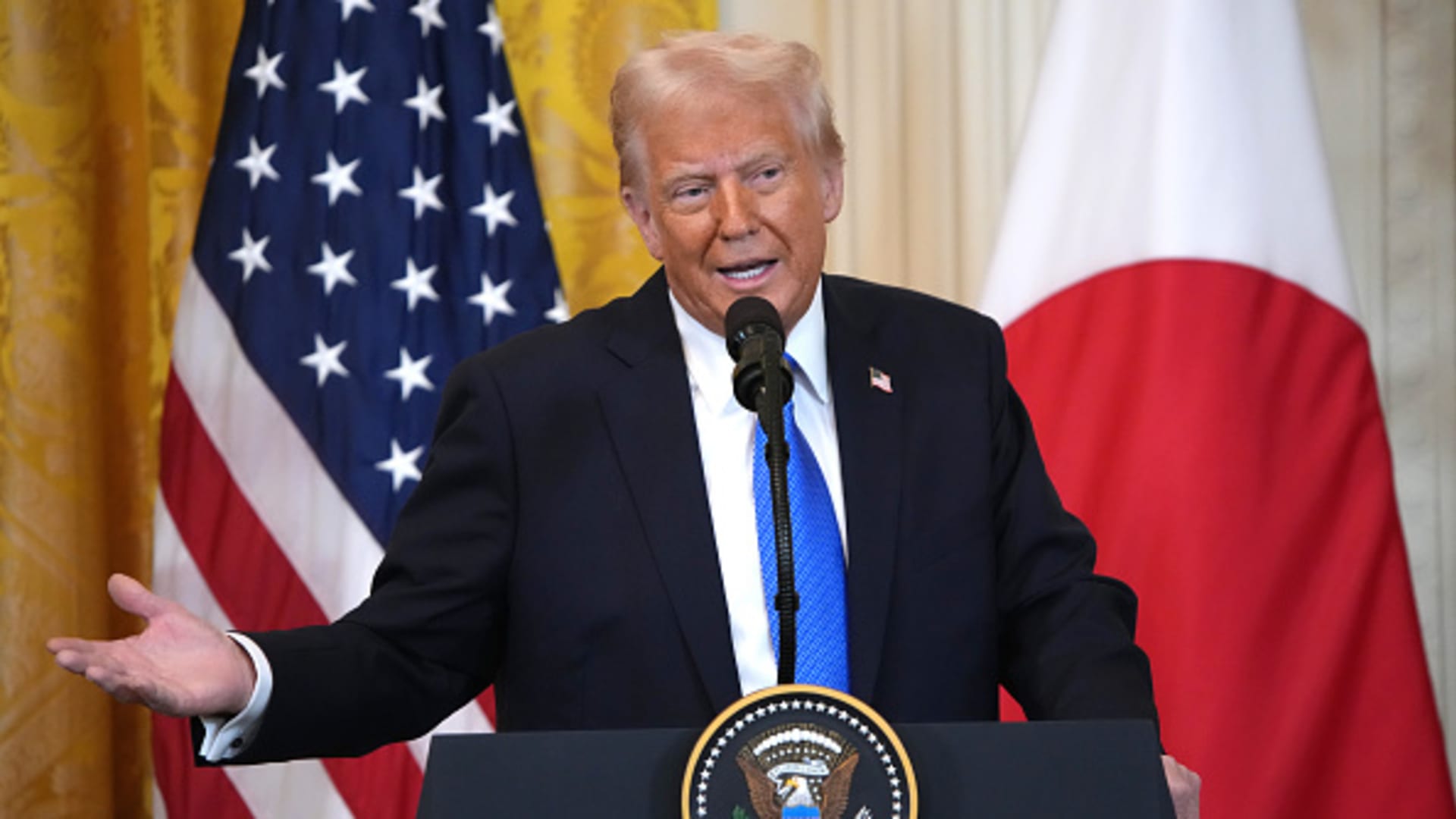U.S. President Donald Trump speaks during a joint press conference with Japanese Prime Minister Shigeru Ishiba in the East Room at the White House on February 07, 2025 in Washington, DC.
Andrew Harnik | Getty Images News | Getty Images
President Donald Trump on Tuesday stateside announced a “massive” deal with Japan that includes “reciprocal” tariffs of 15% on the country’s exports to the U.S., with auto duties reportedly being lowered to that level as well.
In a post on Truth Social, Trump called the agreement “perhaps the largest Deal ever made,” while adding that Japan would invest $550 billion in the United States and the U.S. would “receive 90% of the Profits.”
Trump said that Japan will “open their Country to Trade including Cars and Trucks, Rice and certain other Agricultural Products, and other things.”
The U.S. president added that the deal would create “Hundreds of Thousands of Jobs.”
Japanese Prime Minister Shigeru Ishiba said that auto tariffs on Tokyo will be lowered to 15% — from the current 25% that is levied across countries — Reuters reported. Auto exports to the U.S. are a cornerstone of Japan’s economy, making up 28.3% of all shipments in 2024, according to customs data.
“A year ago, that level of tariffs [15%] would be shocking. Today, we breathe a sigh of relief,” Brian Jacobsen, chief economist at Annex Wealth Management, told CNBC.
Japanese auto exports to the U.S. fell 26.7% in June, extending May’s 24.7% plunge. The country’s overall exports to the U.S. — its second largest trading partner — stood at 10.3 trillion yen ($70.34 billion) between January to June, a 0.8% year-on-year drop.
Shortly after Tuesday’s announcement, Japan’s top trade negotiator, Ryosei Akazawa, said “#Mission Accomplished,” in a post on X, and expressed “heartfelt thanks to everyone involved,” according to a Google translation of his remarks in Japanese.
Trump, in a speech that followed his Truth Social post, said that Japan and the U.S. were also concluding an additional deal involving liquified natural gas, adding that “we have [a] Europe [deal] coming in tomorrow,” without specifying any details.
Political turmoil
The trade deal could strengthen Ishiba’s leadership as it comes just days after Japan’s governing coalition lost its majority in the country’s upper house elections.
Ishiba had said after the upper house loss that he would stay on as prime minister, but Japan’s Mainichi Newspaper reported Wednesday that the prime minister intended to announce his resignation by August, according to a Google translation of the report in Japanese.
Japanese media outlet Yomiuri had reported earlier in the day that Ishiba would decide whether to stay on as prime minister after assessing the progress of the tariff negotiations.
HSBC said in a note Monday that “For Prime Minister Ishiba, a favourable U.S. trade deal could help stave off a no-confidence motion or internal challenge from the LDP [Liberal Democratic Party].”
Japan’s markets jumped after the deal announcement, with major auto stocks soaring, some over 10%, while the broader Nikkei 225 gained more than 2%.
Shares in Japan’s Honda rose over 8%, while Toyota climbed above 11%. Nissan jumped more than 8%, and Mazda Motor surged 17%. Mitsubishi Motors popped 13%.
In his tariff letter sent to Japan earlier this month, Trump had threatened 25% levies on the country’s exports from Aug. 1, one percentage point higher from the 24% rate announced during his April 2 “Liberation Day” tariffs.
Jeremy Schwartz, global CIO at asset manager Wisdomtree told CNBC’s “Squawk Box Asia” that the size of the market reaction meant that the market “got very pessimistic on how things were progressing, overly pessimistic.”
Schwartz also said Trump was using these deals to not just even out the trade deficit, but also to drive strategic spending in the U.S., such as a planned investment by Softbank, OpenAI and Oracle of up to $500 billion in artificial intelligence infrastructure over the next four years.
— CNBC’s Lee Ying Shan and Anniek Bao contributed to this report.

